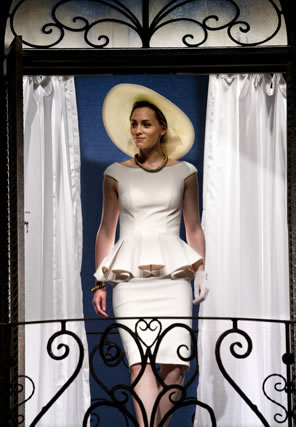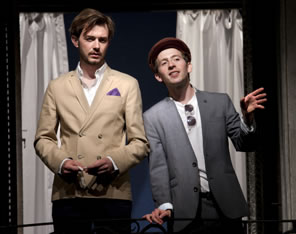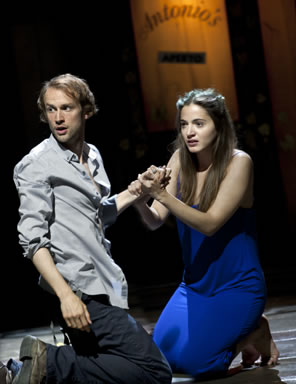The Two Gentlemen of Verona
Perfecting Imperfection
Royal Shakespeare Company, Royal Shakespeare Theatre, Stratford-upon-Avon
Monday, Sept. 22, 2014, "Live from Stratford-upon-Avon," West End Cinema, Washington, D.C.
Directed by Simon Godwin

There's something about Silvia. Sarah MacRae plays the Milanese beauty who unwittingly comes between best buddies Valentine and Proteus in the Royal Shakespeare Company production of William Shakespeare's Two Gentlemen of Verona. Photo bySimon Annan, Royal Shakespeare Company.
I have never contended William Shakespeare was perfect. Even in his best plays he slips up here and there. Then there's The Two Gentlemen of Verona. The best I can say about that play is that, even at his worst, Shakespeare slips in some nice bits here and there. The play's greatest value among critics is that it serves as antecedent to the Shakespearean genius to come, a first draft, as it were, for many of his more iconic characters and moments later in the canon (look for the spaniel motif as one of many instances of this).
But what if we make imperfection itself perfection? The Royal Shakespeare Company embraces The Two Gentlemen of Verona as perfectly imperfect, its form, albeit unintentionally, mirroring its content as all of its characters are vivid portrayals of imperfect people. The common bond between playwright and these characters is youth. Director Simon Godwin approaches Two Gents with the idea that the fledgling Shakespeare, coming of age himself, wrote a play about young people coming of age. Immature, rambunctiously romantic, self-absorbed, full of comic irony, full of bravado, lacking grace and social sensitivities: are we describing the play or its characters? Both.
Godwin puts his theory to a stiff test by setting Two Gents in modern-day Verona and Milan in his staging at the Royal Shakespeare Theatre, a production we saw via the RSC's Live from Stratford-upon-Avon cinema broadcast. This turns a Shakespearean relic into something you might see on Bravo: Watch NeNe lock horns with Cynthia on The Real Housewives of Atlanta, and stay tuned to see Proteus betray Valentine in The Two Gentlemen of Verona. Instead of ruff collars and hanging sleeves, we're seeing Gucci and Prada, and though everybody is speaking Elizabethan English and most of the lines are in iambic pentameter, it all sounds viably modern—uncomfortably so.
Never mind the ending (which we'll discuss a little later); listen to Valentine (Michael Marcus) advise the Duke of Milan (Jonny Glynn) on how to court a woman. "If she do frown, 'tis not in hate of you, but rather to beget more love in you. If she do chide, 'tis not to have you gone… Take no repulse, whatever she doth say, for 'get you gone' she doth not mean 'away!'" This is stalker talk. Sure, Shakespeare wrote that in the un-PC 16th century, but even with our 21st century "no means no" sensibilities, as we watch a stylish Valentine casually speak these lines, we realize his reprehensible notion of courtship is practiced by way too many men today. Nothing has changed in human nature since Shakespeare's time; only society's expectations have evolved.
What the four leading actors in this production—Marcus as Valentine, Mark Arends as Proteus, Pearl Chanda as Julia, and Sarah MacRae as Silvia (plus ancillary players Leigh Quinn as Lucetta and Nicholas Gerard-Martin as Turio)—accomplish are contexts for their characters that are familiar to today's audience. Designer Paul Wills provides in his set and costuming the divergent worlds of Verona and Milan. The former, represented by a cafe with sidewalk seating lit by heart-shaped lamps, seems to be a provincial burg: both Proteus and Julia are dressed in simple, discount rack clothes, and Lucetta is a waitress (nice pun on the part, turning Julia's servant into a server). Milan, represented by a discotheque and the balcony window of a condo overlooking the plaza, is a happening, hip place: both Silvia and Valentine are dressed in hot designer fashions, and Turio is a wealthy, partying scion.
As the play starts, Proteus, exchanging glances with Julia in the cafe, does not look so much like a romantic but a disheveled artist. He has no interest in styling his hair, let alone shopping for cool jeans and shirts that fit. Arends plays him as a man with some self-esteem issues, too, especially in his bumbling courtship of Julia. After all, this is a guy who enlists others to deliver his love messages for him. Even in their first scene, Proteus stands in juxtaposition to the sharp-dressed, smooth-mannered Valentine, the self-conscious nerd to the cocky jock. It's no wonder that this Valentine is itching to get to the big city, while more than Julia keeps Proteus in Verona: the place suits him.
Milan would not seem to suit Proteus, but when he gets there, Arends starts reinventing his Proteus as the cool dude, relying on his language skills to climb the social ladder (and he starts taking advantage of the men's boutiques in Milan, too). It's not just Silvia that catches his fancy, but Valentine—specifically, what Valentine has become in Milan, including being beloved of such a one as Silvia. "Is it mine eye or Valentine's praise?" he says in his first soliloquy signaling his shifting affections from Julia to Silvia. Valentine prompts this shift in the way he brags about Silvia, saying of Julia by way of comparison, "She shall be dignified with this high honor, to bear my lady's train, lest the base earth should from her vesture chance to steal a kiss." When Proteus protests Valentine's "braggardism," his friend replies, "Pardon me, Proteus: all I can is nothing to her whose worth makes other worthies nothing." Geesh, just call your best friend's girlfriend a dog, why don't you? In Proteus's eyes, though, the ever-cool Valentine is blabbering with the kind of romantic fervor he had always ridiculed back in Verona, adding even more luster to the radiant Silvia who has already mesmerized Proteus in their first, brief meeting.
Not that I'm calling Chanda's Julia a dog, mind you, for once her Julia gets out of Verona and her dowdy wardrobe, she, too, blossoms into a fascinating personality, even when dressed as a man. However, there's something about Silvia. In MacRae's portrayal, she has an innate sense of style and a natural grace, but she's one tough chick, too. She can be coquettish and cocky at the same time; she can flirt, and she can scrap. Proteus, like all the other men in Milan, falls under her spell from the moment they meet as she teases him about being "too low a mistress for so high a servant" while giving him sly, winking looks. What Proteus doesn't get is that MacRae's Silvia is really teasing Valentine. Proteus is the friend Valentine has talked of so often, and Silvia is throwing down the gauntlet to Valentine to regard her more highly than he does his friend; Proteus mistakenly picks up the gauntlet for himself.
This Silvia has Marcus's Valentine wrapped tightly around her little finger, but yet he's more than a pretty boy toy to her; she is devotedly in love with him. Exactly why is not clear except that Valentine is clearly the best-looking of all the self-absorbed jerks in Milan—among whom Proteus soon becomes the biggest jerk of all. We finally see some of Valentine's true virtue after his banishment in the way he bluffs his way from being a hostage of the outlaws to their captain and in his behavior in the infamous ending. Valentine does more than stop Proteus from raping Silvia; he overpowers him and, while bombasting blank verse at his former friend, tries to drown him in a water barrel. Silvia stops Valentine, whereupon he pulls a pistol on Proteus. At first, she joins Valentine in holding the pistol, which, understandably, prompts Proteus to repent. Silvia slowly pulls back Valentine's arm, and it is at this point that Valentine speaks Shakespeare's most problematic verse—"All that was mine in Silvia I give thee"—with a generic sense that he and Silvia are one.


Top, Speed (Martin Bassindale, right) describes love-struck men to love-struck Valentine (Michael Marcus) in Milan. Above, Proteus (Mark Arends) parts with Julia (Pearl Chanda) in Verona. Photos by Simon Annand, Royal Shakespeare Company.
We don't have time to mentally process this, though, because Julia rushes to her reveal. A key to making this moment credible is in the relationship already established between Julia and Silvia. Chanda and MacRae turn their Act Four, Scene Four meeting into enthralling theater. Silvia is predisposed to hate Proteus's latest messenger while Julia is predisposed to scratch out the eyes of her rival. But as their talk turns to Julia (Silvia is the first to bring up Proteus's forsaken love), they bond. Silvia grows fond of Julia through the proxy boy, while Julia struggles hard to keep her disguise intact. They part in a genuine fealty that Silvia doesn't quite understand and Julia can't fully accept. In the final scene, the disguised Julia has been watching in the woods all that has transpired, from Proteus's assault on Silvia through Valentine's rescue of Silvia and Silvia's rescue of Proteus, and her own courage bursts through her disguise. Proteus's line "What is in Silvia's face but I may spy more fresh in Julia's with a constant eye?" could easily come off as trite but here is discovered truth. I'm not calling MacRae's Silvia a dog, mind you, but Julia in this moment has becomes "sovereign to all the creatures on the earth," including Silvia.
Speaking of dogs, Crab (Mossup) really is is an ugly one. Officially, Mossup is a lurcher, which itself is a crossbreed, but this one looks like it contains some 20 different ancestral lines, from whippet to Yorkshire terrier. His coat is a combination of wire bristles and long hair with a tuft of fur crowning his forehead and a tail that bends three times before reaching its tip. Mossup is a theater and television veteran, however, and he gives Crab a persistent indifference in his relationship with Launce, though he whimpers during the clown's farewell-to-the-family and banquet scene shticks, perhaps because he's such a pro that he is trying to rescue his counterpart from dying on the stage there.
Launce (Roger Morlidge) reminds me of Otis in the old Andy Griffith Show, and he delivers his spiels with affinity to the text, but he earns only one chuckle from the Royal Shakespeare Theater audience in his speech describing his parting from the family (when he reacts to his mother's odor, i.e., his shoe), and gets a few half-hearted laughs as he recounts Crab's indiscretion in the banquet hall (but, again, Mossup may be winning those laughs). While Morlidge's Launce is underappreciated by the in-theater patrons, Speed (Martin Bassindale) out and out dies with this crowd, and the two clowns' routine of the milkmaid's inventory turns into a stage murder-suicide.
Exactly why the comic bits aren't comic in this performance, I can't put my finger on because both actors make the language accessible. What's more important, however, is that the love-sick Valentine upstages Speed's description of the love-sick Valentine, and Proteus gets more laughs in his two centerpiece soliloquies than the two clowns combined—and these are valid laughs generated by the text and the way Arends delivers it from Proteus's heart. While many modern productions seek to establish the Valentine-Proteus plot as serious drama and turn Speed and Launce into comic relief, Godwin makes Valentine and Proteus plus Silvia and Julia the play's comic core.
This production is the first Two Gents to be presented on RSC's main stage in more than 44 years, an absence that I think gives the company much credit. The only reason it finally made it back to the Royal Shakespeare Theatre is because RSC Artistic Director Gregory Doran is intent on staging the entire Shakespeare canon as part of an ongoing celebration that started with the 450th anniversary of Shakespeare's birth this year and runs beyond the 400th centennial of his death in 2016. However, Godwin and a cast of accomplished players have proven this comedy to be dramatically funny in and of itself and suitably relevant; it is an imperfectly fine play.
Eric Minton
October 8, 2014
Special Note
Compared to the broadcasts of the two parts of Henry IV this past summer, the filming of The Two Gentlemen of Verona is a tick better. Camera movements provide dramatic reveals that enhance the storytelling. Still, too many close-ups keep us from seeing reactions. One of the things live theater offers us that cinema's directed focus does not is the opportunity—often times rich—of seeing what other characters are doing in the background. We miss such moments, but at least the camera work this time hones Director Godwin's contextual intent.
Comment: e-mail editorial@shakespeareances.com.
Start a discussion in the Bardroom



 Find additional Shakespeareances
Find additional Shakespeareances